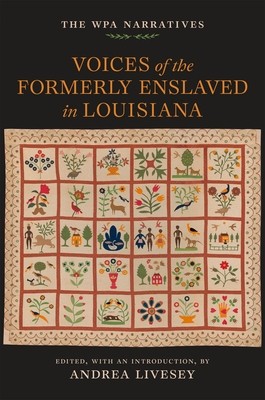
- We will send in 10–14 business days.
- Author: Andrea Livesey
- Publisher: LSU Press
- ISBN-10: 0807183024
- ISBN-13: 9780807183021
- Format: 17.8 x 16.5 x 3.8 cm, kieti viršeliai
- Language: English
- SAVE -10% with code: EXTRA
Reviews
Description
In the 1930s, thousands of formerly enslaved Americans were interviewed across the United States as part of the Works Progress Administration's Federal Writers' Project. While most of those interviews were subsequently published, Louisiana's were not. Gathered here for the first time in complete and contextualized form are the full interviews with the formerly enslaved in Louisiana, the transcripts of which had been separated, fragmented, and distributed throughout archives in the state. Reassembled and analyzed by historian Andrea Livesey, the interviews are critical for understanding how Black Louisianans experienced enslavement but also resisted and built distinctive cultures, communities, and families in spite of it. Equally important is the testimony of how they negotiated emancipation and built relationships after freedom.
Livesey discusses the impact of Lyle Saxon, a well-known writer who headed the Louisiana branch of the Writers' Project, and Louisiana poet Marcus B. Christian, who led the segregated Black unit. Other unique aspects of the collection are interviews in Kouri Vini and Louisiana French and descriptions of Voodoo, Marie Laveau, and medicine practiced in Black communities of the era. Livesey invites readers to pay critical attention to how the interviewers may have influenced the narrative preserved in the archive through interpersonal dynamics or editing as they transcribed the interview. Alongside the extended introduction to the volume, this analysis sheds light on the administrative structures and racialized dynamics that initially shaped the interviews.EXTRA 10 % discount with code: EXTRA
The promotion ends in 23d.14:31:57
The discount code is valid when purchasing from 10 €. Discounts do not stack.
- Author: Andrea Livesey
- Publisher: LSU Press
- ISBN-10: 0807183024
- ISBN-13: 9780807183021
- Format: 17.8 x 16.5 x 3.8 cm, kieti viršeliai
- Language: English English
In the 1930s, thousands of formerly enslaved Americans were interviewed across the United States as part of the Works Progress Administration's Federal Writers' Project. While most of those interviews were subsequently published, Louisiana's were not. Gathered here for the first time in complete and contextualized form are the full interviews with the formerly enslaved in Louisiana, the transcripts of which had been separated, fragmented, and distributed throughout archives in the state. Reassembled and analyzed by historian Andrea Livesey, the interviews are critical for understanding how Black Louisianans experienced enslavement but also resisted and built distinctive cultures, communities, and families in spite of it. Equally important is the testimony of how they negotiated emancipation and built relationships after freedom.
Livesey discusses the impact of Lyle Saxon, a well-known writer who headed the Louisiana branch of the Writers' Project, and Louisiana poet Marcus B. Christian, who led the segregated Black unit. Other unique aspects of the collection are interviews in Kouri Vini and Louisiana French and descriptions of Voodoo, Marie Laveau, and medicine practiced in Black communities of the era. Livesey invites readers to pay critical attention to how the interviewers may have influenced the narrative preserved in the archive through interpersonal dynamics or editing as they transcribed the interview. Alongside the extended introduction to the volume, this analysis sheds light on the administrative structures and racialized dynamics that initially shaped the interviews.

Reviews